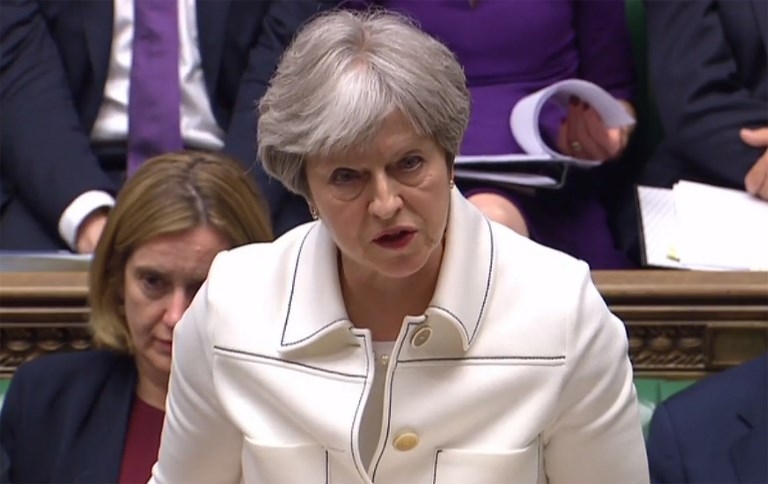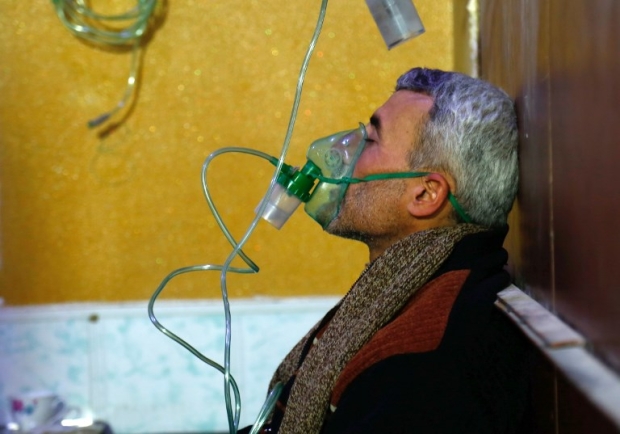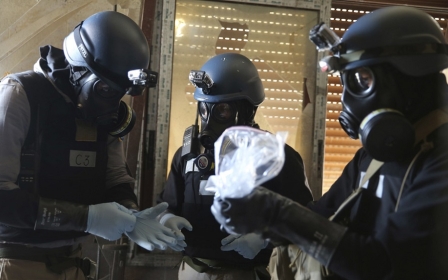May vows to strike Assad if chemical weapons used again

UK Prime Minister Theresa May vowed to strike Syria again if its president Bashar al-Assad continues to use chemical weapons on his people.
Speaking at an emergency session in parliament on Monday, May vehemently rejected claims that Britain had followed orders from America when it agreed to strike Syria.
"We have not done this because President Trump asked us to do so. We have done it because we believe it was the right thing to do," May told parliament.
"Nobody should be in any doubt of our resolve to ensure that we cannot see a situation where the use of chemical weapons is normalized"
- UK Prime Minister Theresa May
She also used her speech to justify why the UK government thought the Syrian government was responsible for the suspected chemical attack in Douma and said that Russia would veto any military intervention by the UK if it went through diplomatic channels.
"A significant body of information-including intelligence indicates the Syrian regime is responsible for this latest attack," May said on Monday.
"The opposition does not operate helicopters or use barrel bombs. Daesh does not even have a presence in Douma," she said, referring to the Islamic State (IS) group.
When asked whether she could order new strikes if chemical weapons were found to have been used in the future, May said: "Nobody should be in any doubt of our resolve to ensure that we cannot see a situation where the use of chemical weapons is normalised.”
Labour leader Jeremy Corbyn meanwhile voiced his condemnation of the attacks and described the Syrian air strikes as "legally questionable".
He used his speech to reiterate calls for the introduction of a "war powers act" that would give parliament the power to "support or stop" any military action taken by the British government.
"We clearly need a war powers act in this country to transform a broken convention into a legal obligation," Corbyn told Parliament.
"Does, for example, the humanitarian catastrophe in Yemen, entitle other countries to arrogate themselves the right to bomb Saudi airfields or their positions in Yemen, especially because of their use of banned cluster bombs?"
Stop the War, a coalition once chaired by Corbyn, held a demonstration outside parliament on Monday.
The group said the strikes "will have done nothing to end the war" and "risked dramatically widening" the conflict.
The leaders of the opposition Scottish National Party and Liberal Democrats have also criticised May and there is the possibility of a vote in parliament later Monday that could embarrass the prime minister if she loses.
French opposition
In France, President Macron has faced criticism for attacking Syria without consulting the legislature, but defended the move as well as his constitutional powers, in a TV interview on Sunday.
"This mandate is given democratically to the president by the people in the presidential election," he said.
Macron also said he had convinced US President Donald Trump to stay engaged in Syria "for the long-term".
Macron has been criticised by various French politicians.
National Front leader Marine Le Pen accused Macron of failing to show any evidence on the use of chemical weapons by the Syrian government to justify the strikes.
Jean-Luc Melenchon, head of the hard-left France Unbowed party, also condemned the strikes, while the leader of the centre-right Republicans party, Laurent Wauquiez, said he "did not believe in punitive strikes".
But at a press conference in Paris on Monday, Macron said that France had acted with "international legitimacy".
He argued the operation was legitimate despite not being sanctioned by the UN, citing a 2013 UN resolution that required Syria to destroy its chemical weapons arsenal.
Loss of public support
Ahead of May's speech in parliament and talks with EU foreign ministers, Foreign Secretary Boris Johnson on Monday said the strikes were "right for the UK and right for the world".
"It was the world saying that we have had enough of the use of chemical weapons, the erosion of that taboo that has been in place for 100 years has gone too far under (Syrian President) Bashar al-Assad," he said.
But a poll showed scant public support for the move.
The poll by Survation for the Mail on Sunday found that 36 percent of the public was in favour of Britain's participation in the air strikes; 40 percent were against and the remainder were undecided.
Out of the 2,060 respondents in the survey, 54 percent also agreed with the statement that May "should have held a parliamentary debate and vote before intervening militarily in Syria".
Middle East Eye propose une couverture et une analyse indépendantes et incomparables du Moyen-Orient, de l’Afrique du Nord et d’autres régions du monde. Pour en savoir plus sur la reprise de ce contenu et les frais qui s’appliquent, veuillez remplir ce formulaire [en anglais]. Pour en savoir plus sur MEE, cliquez ici [en anglais].





